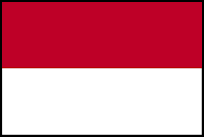Monaco : Early History
 The first inhabitants of the area, the Ligurians, probably arrived when the immigrant warriors who spoke an Indo-European language first penetrated into Provence and Liguria. Ancient authors, the historian Diodorus Siculus and the geographer Strabon, described the Ligurians as a race of mountaineers used to the hardest work and practicing an exemplary frugality.
The first inhabitants of the area, the Ligurians, probably arrived when the immigrant warriors who spoke an Indo-European language first penetrated into Provence and Liguria. Ancient authors, the historian Diodorus Siculus and the geographer Strabon, described the Ligurians as a race of mountaineers used to the hardest work and practicing an exemplary frugality.
Founded by the Phocaeans of Massalia during the 6th century, the colony of Monoikos became an important port of the Mediterranean coast. Monoikos, from Greek roughly translates to "single house," enforcing the ideas of sovereignty, self-sufficiency and self-reliance.
Ancient myths venerate Hercules as having passed through this area. To this day there is evidence of an admiration of Hercules: the largest port is named Port Hercule. The opening of the route which runs parallel to the coast from Italy to Spain, together with the construction of the old fortifications which were found there, were attributed by the peoples of the past to the great hero of Greek mythology, Heracles, known to the Romans as Hercules. Altars were dedicated to him at the main crossroads of the modest road known as “The Road of Hercules”. A complete temple was consecrated to him in the Ligurian port of Monaco. Throughout antiquity, this place was known as Port Hercules. Phoecian and Carthagenian sailors contributed to its prosperity.
The name “Monaco”, “Monoikos” in Greek, is nearly always associated with that of Hercules by the ancient writers. In Greek, Heracles Monoikos may mean “Heracles alone” or “Heracles who has only one temple”. This is popular etymology. The name “Monoikos” is certainly a native one and must have its origin in the Ligurian language. It does not appear to be the name of a tribe. The coast and the harbor of Monaco were probably the outlet to the sea for a great Ligurian people of the hinterland, the Oratelli of Peille.
While the Roman period lasted, Monaco was part of the Province of the Maritime Alps. Julius Caesar embarked from its harbor on his way to lead his campaign in Greece. After the fall of the Roman Empire in the fifth century, the whole region was ravaged by the barbarians; this period of invasions lasted until the end of the tenth century. After the expulsion of the Saracens in 975, little by little people began to return to live on the Ligurian coast.
|
NEWSLETTER
|
| Join the GlobalSecurity.org mailing list |
|
|
|

